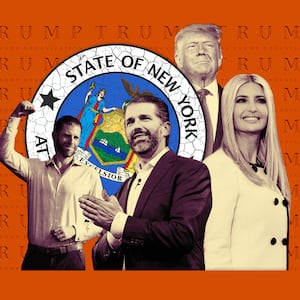Banks and insurance companies trying to keep the public in the dark about their business dealings with Donald Trump ran into a ray of legal sunshine on Tuesday, after a judge ruled that he wouldn’t seal records in the run-up to the New York Attorney General’s upcoming trial against the real estate mogul.
A handful of firms associated with Trump made a last-ditch effort to hide documents that detailed the way they unwittingly became part of the Trump Organization’s alleged scheme to inflate assets. But the judge, Arthur F. Engoron, ruled that—aside from information like the home addresses of certain employees and bank account numbers—the public has a right to see the documents and communications.
The former president is just 34 days away from heading to civil trial in New York City, where his personal finances will be put under a microscope while the state’s AG tries to bleed his corporation dry over the way it routinely overstated its holdings on official documents.
But with that trial around the corner, the companies that kept lending him hundreds of millions of dollars for business deals are trying to quietly slink away into the shadows—and hide the paperwork that shows how they played along.
Zurich American Insurance Company, WSFS Bank, Ladder Capital and others earlier this month asked the judge overseeing the case to seal documents that detailed the way they communicated with the Trump Organization while they evaluated its assets.
Some of these records form the backbone of AG Letitia James’ $250 million lawsuit against the Trumps, purportedly showing how the real estate mogul and the family members he made executives got away with minimal scrutiny—by asserting fantastical financial numbers that weren’t examined carefully. Had they been, auditors and loan officers would have realized that Trump was easily doubling and tripling the value of property to snag better bank loans and insurance policies.
Zurich, for its part, claimed some documents—which had already made their way into the court docket as evidence—”contain highly-sensitive, non-public proprietary information about Zurich’s insurance business, including Zurich’s highly protected underwriting guidelines” and “competitively sensitive financial information.”
Meanwhile, lawyers for WSFS Bank complained that journalists have been trying to reach one of their employees over his role in a business lifeline tied to Trump’s estate north of New York City—a failed development project that he nonetheless valued as if it were a success when he donated the land to conservation and got a massive tax break.
“One employee who has already been publicly linked to the Seven Springs loan receives unwanted media inquiries every time the case appears in the news, which he finds ‘disruptive and distressing,’” the bank complained earlier this month.
The AG pushed back in court documents, citing the need in a democratic society for the American public to have access to ongoing court battles. Her lawyers also quoted legal precedent that “neither the potential for embarrassment or damage to reputation, nor the general desire for privacy, constitutes good cause to seal court records.”
On Tuesday afternoon, Judge Engoron said he’d allow the companies to hide personal information, but he sided with the AG that most of the documents should stay in the open.
“Here, the non-parties have failed to demonstrate a compelling interest in favor of wholesale sealing that outweighs the public’s right to access and the presumption in favor of open judicial proceedings,” Engoron wrote.






